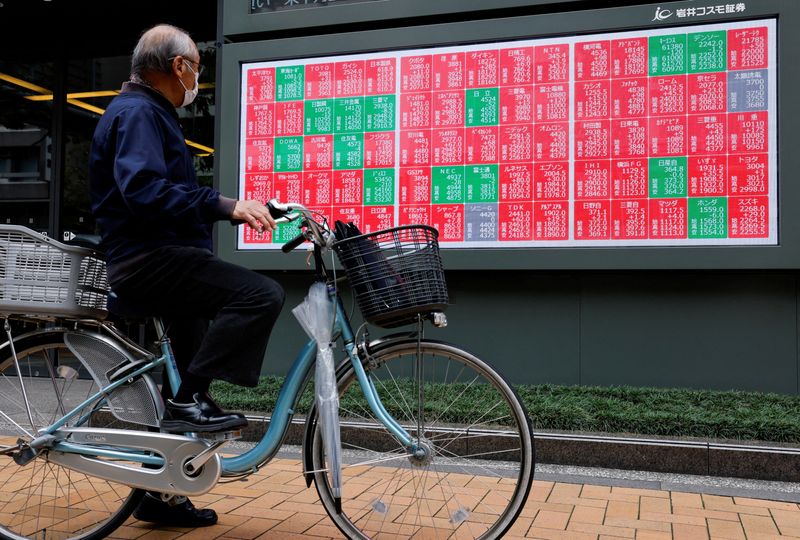By Scott Murdoch
SYDNEY (Reuters) -Asian share markets rallied on Tuesday as hopes grew the Federal Reserve will deliver a December interest rate cut, while investors piled into global technology stocks shrugging off concerns the sector was becoming overheated.

MSCI’s broadest index of Asia-Pacific shares outside Japan rose 1% led mainly by tech stocks, recouping some of the losses from last week when it fell 4%. The index is on course for a 3.8% drop in the month, its first monthly decline since March.
Japan’s Nikkei was up 0.8% in early trading on Tuesday after returning from a holiday on Monday. The index slid 3.5% last week as a bout of risk-off sentiment gripped markets.
“Nice to see widespread cross-asset class green on the screens this morning as volatility eases a notch and the Fed put comes into play again,” Charlie Aitken, Regal Partners’ investment director, said in a note.
“This is classic bull equity market behaviour. A short, sharp pullback in stocks and sectors that have led the market, a flush out of the over-leveraged at the bottom, and a recovery starts, led by the most beaten-up growth stocks and cyclicals.”
The prospect of a U.S. rate cut is rising after Fed Governor Christopher Waller said available data indicated that the U.S. job market remains weak enough to warrant another quarter-point cut to interest rates.
Markets are pricing in an 85.1% chance of a cut of 25 basis points at the December meeting, according to CME’s FedWatch Tool, up from 42.4% a week ago. The U.S central bank will meet on December 9 and 10.
San Francisco Federal Reserve Bank President Mary Daly told the Wall Street Journal she supported lowering interest rates at the central bank’s meeting next month as she sees a deterioration in the job market.
In the Asian trading session, the yield on benchmark 10-year Treasury notes was flat at 4.0344%. The two-year yield, which rises with traders’ expectations of a higher Fed funds rate, was steady at 3.4872% in Asian hours after dropping 2.5 basis points in the previous session.
The sudden shift in rate cut wagers have weighed slightly on the dollar. The euro last bought $1.1522 after eking out small gains overnight. The dollar index was at 100.2 in early trading.
Despite the dollar’s slight weakness this week, the Japanese yen has remained fragile, trading at 156.95 per dollar in early Asian hours, not far from the 10-month low of 157.90 it touched last week.
An ongoing row between Tokyo and Beijing over a comment by Japan’s Prime Minister Sanae Takaichi earlier in November that a Chinese attack on Taiwan could trigger a Japanese military response remains in focus.
Takaichi and U.S. President Donald Trump spoke on Tuesday, following his call on Monday with Chinese President Xi Jinping. She said Trump explained U.S.-China relations to her.
Trump said on Monday he would travel to Beijing in April at the invitation of the Chinese government. The proposed meeting was interpreted as a further sign diplomatic and political relations between the two countries are improving following their trade war truce.
On Wall Street, the Dow Jones Industrial Average rose 0.44%, the S&P 500 was 1.55% higher and the Nasdaq Composite rose 2.69% fuelled by large gains in tech stocks.
The session marked the Nasdaq’s biggest daily percentage rise since May 12 and the best two-day rise since November 2024.
U.S stock and bond markets will be closed on Thursday for the Thanksgiving holiday and will trade for half a day on Friday.
In commodities, Brent crude futures were down 0.2% at $63.16 a barrel, while U.S. crude futures were also off 0.2% at $58.70 per barrel.
Spot gold was 0.2% lower at $4,130 an ounce.
(Reporting by Scott Murdoch; Editing by Sonali Paul)


